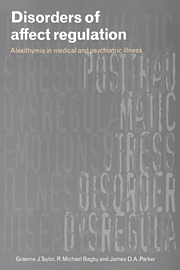Book contents
- Frontmatter
- Contents
- Foreword
- Acknowledgments
- Acknowledgment of permission for use of material
- Introduction
- 1 The development and regulation of affects
- 2 Affect dysregulation and alexithymia
- 3 Measurement and validation of the alexithymia construct
- 4 Relations between alexithymia, personality, and affects
- 5 The neurobiology of emotion, affect regulation, and alexithymia
- 6 Somatoform disorders
- 7 Anxiety and depressive disorders and a note on personality disorders
- 8 Substance use disorders
- 9 Eating disorders
- 10 Affects and alexithymia in medical illness and disease
- 11 Treatment considerations
- 12 Future directions
- Appendix
- References
- Index
3 - Measurement and validation of the alexithymia construct
Published online by Cambridge University Press: 21 September 2009
- Frontmatter
- Contents
- Foreword
- Acknowledgments
- Acknowledgment of permission for use of material
- Introduction
- 1 The development and regulation of affects
- 2 Affect dysregulation and alexithymia
- 3 Measurement and validation of the alexithymia construct
- 4 Relations between alexithymia, personality, and affects
- 5 The neurobiology of emotion, affect regulation, and alexithymia
- 6 Somatoform disorders
- 7 Anxiety and depressive disorders and a note on personality disorders
- 8 Substance use disorders
- 9 Eating disorders
- 10 Affects and alexithymia in medical illness and disease
- 11 Treatment considerations
- 12 Future directions
- Appendix
- References
- Index
Summary
In any field of scientific inquiry, it is necessary to demonstrate the validity of a new hypothetical construct and to show that it is not merely a new name for an already established construct. Until recently, however, the need to subject alexithymia to a rigorous evaluation of construct validity was ignored, perhaps because the construct was derived from psychoanalytic observations, a field in which empirical research has been relatively neglected. As Lesser and Lesser (1983) have pointed out, there was a risk that alexithymia would be reified as most of the early advocates of the construct took its validity for granted and directly embarked on investigations to compare levels of alexithymia in different clinical populations. Most of this research was conducted with rather hastily constructed measures of alexithymia whose psychometric properties had not been adequately evaluated. Subsequent research (which will be described in this chapter) has shown that many of these measures lack adequate reliability and validity, thus questioning the validity and generalizability of results from the various studies that used them.
The development of a reliable and valid instrument for measuring a construct is in fact a widely used method of construct validation in the field of personality research (Hogan & Nicholson, 1988). Indeed, Cronbach and Meehl (1955) have argued that the validity of a construct cannot be evaluated independently of the tests that purport to measure that construct.
Information
- Type
- Chapter
- Information
- Disorders of Affect RegulationAlexithymia in Medical and Psychiatric Illness, pp. 46 - 66Publisher: Cambridge University PressPrint publication year: 1997
Accessibility standard: Unknown
Why this information is here
This section outlines the accessibility features of this content - including support for screen readers, full keyboard navigation and high-contrast display options. This may not be relevant for you.Accessibility Information
- 47
- Cited by
